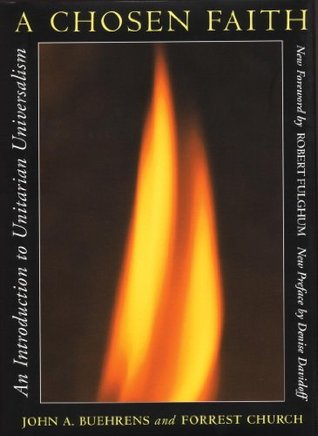More on this book
Kindle Notes & Highlights
Read between
December 9 - December 10, 2022
Religious liberalism does not require fidelity to the latest fashion, only to remaining open to new sources of inspiration.
One need not accept the tenets of ancient animism to perceive heaven in a mustard seed or a world in a grain of sand. To do so is not to reject rationalism, or even skepticism, which guards us from irrational delusion. Thoughtful people can maintain an eye both critical and open.
Earth-centered traditions are therefore a natural source for Unitarian Universalism. We may claim no inside knowledge of the creator, but we are quick to affirm, learn from, and protect the creation. “The gods and goddesses—or, if you prefer, the most precious and profound—are accessible to us in the taste of honey and the touch of stone,” Bill Shultz writes.
Knowing that we need not think alike to love alike, we acknowledge the integrity of spiritual insights that differ from our own, so long as our neighbor returns the favor.
Over the years I have come to realize that our covenant with one another is guided more by common values than by common beliefs.
This sense of connectedness distinguishes Unitarian Universalism from many other faiths, where one true path leads in a separate direction from other false ones.
Unitarian Universalism gives me a place to be at home with some of my closest friends: my doubts.” At home with our doubts, we can live more companionably with one another. Mysteriously born, fated to die, we are bound to one another by the mortar of mortality. Despite our many differences, we are one.
Unlike those religions that view the world as a charnel house from which we must escape, Unitarian Universalism reveres the creation and challenges us to nurture it, even to defend it against ourselves when we lose our sense of intimacy with the earth as the ground of our being, the living web that connects us.
No difference that divides us comes close to all that unites us on this tiny speck of living dust on a single grain of sand on the vast beach of the creation.
Genuine reverence and humility, genuine tears of compassion, genuine enduring love for others, and genuine joy in the miracle of Being.
“The spirit of good poetry and of authentic religion are the same,” Jake would say, “imaginative compassion.”
Jake called it “returning to the springs.” He found it at the source of all spiritual traditions: mystery, awe, and renewal; basic gratitude for the unmerited beauty of Being itself; faith that isn’t dogma, real hope, and enduring love. Jake was never my pastor. When I first knew him, he was retired. I’d spent a year as a student minister in the church where he’d served for a quarter century. “We knew each other before we ever met,” he used to say.
Great Spirit, whose voice is heard in the stillness, whose breath gives life to all, we come before you as children needing the help of your strength and wisdom. Give us to walk in beauty, seeing the uncommon in the common, aware of the great stream of wonder in which we and all things move. Give us to see more deeply into the great things of our heritage, and the simple yet sublime truths hidden in every leaf and every rock. May our hands treat with respect the things you have created. May we walk with our fellow creatures as sharing with them the one life that flows from you.
“Return to the source,” says a Chinese proverb, “and you find the meaning.”
Especially with youth groups and people new to Unitarian Universalism, my point was to make sure they were aware that they had returned to the springs of American concern for spiritual freedom and equality. The challenge, of course, is to renew that spiritual concern in our own time, in our own lives.
“We join in celebrating one world, one people, one love, which is Truth.”


